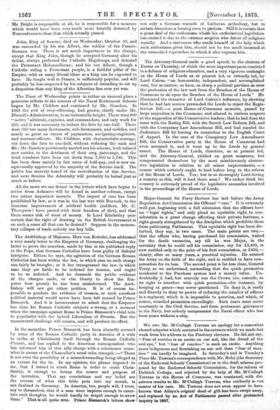Major-General Sir Percy Herbert has laid before the Army Regulation
Act Commission the Officers' "case." It is extremely well put, beginning with a full admission that the officers have no "legal rights;" and only plead an equitable right to con- sideration in a great change affecting their private fortunes, a right greatly strengthened by the discipline which prohibits them from petitioning Parliament. This equitable right has been dis- turbed, they say, in two cases. The main L points are two,— that the officer who, having purchased his commission, waited for the death vacancies, say till he was Major,. in the certainty that he could sell his commission, say for £3,400, is now entitled only to the price of his first commission, or l450,— clearly, after so many years, a practical injustice. He entered. the Army on the faith of the right, and is entitled to have com- pensation for its loss. The second point is far less clear, General Percy, as we understand, contending that the quick- promotion incidental to the Purchase . system had a money valne. Un- doubtedly had, but scarcely one the Crown can concede, as its right to interfere with quick promotion—for instance, by keeping at peace—was never questioned. To deny it, is really and directly to deny its power of reducing -the niunber of officers in a regiment, which it is impossible to question, and which, of course, retarded promotion exceedingly. Such cases must occur constantly in the Civil Service, and form permanent grievances in the Navy, but nobody compensates the Naval officer who has been years without & ship.


































 Previous page
Previous page